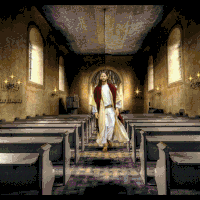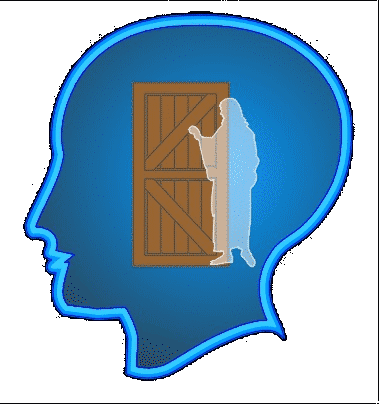Hello, Wordkeeper!I don't think you made a clear connecting between materialism and the tendency for Calvin to deny the presence of Christ in the Eucharist.
If there is no problem under the laws of physics with a body being in two places at once or having a vast number of pieces of itself be separated from itself over vast distinctions, then how is it "incredible" to make such claims?
Yet in the quotations I gave in my Third Question I linked to, eg. from the Institutes, that was exactly Calvin's stated objection to the Lutheran idea of the Eucharist having Christ's body - that it was "absurd" and "incredible" for Christ's body to be scattered or in two places.
But if there is no materialistic conflict, then such an idea is not absurd anymore than it would be about something immaterial, like a concept could be scattered through millions of peoples' minds.
The Lutherans had said that Christ could be omnipresent or go through walls (Jn 20) or be in the Eucharist bread, and considered Calvin to be subordinating Christ's body to the "ordinary laws of nature", as Calvin notes in his Institutes:
These men [Lutherans] teach that he is in every place, but without form. They say that it is unfair to subject a glorious body to the ordinary laws of nature. But this answer draws along with it the delirious dream of Servetus[burned by Swiss Reformed], which all pious minds justly abhor...
Yes. However it is essentially materialistic as Kenneth Keathley explained, since in its scheme God's tool is matter and the believers in effect lack free will.Calvin believed in determinism, but I'm not sure he linked it to materialism. His determinism may actually have attributed election on spiritual intervention from God, making from the same lump vessels for noble as well as ignoble use, whilst a pure materialist would attribute ignoble use to ignoble clay.
The reason that he found this to be the "held doctrine" was because he found the longstanding Lutheran/Catholic view "absurd". And what was absurd about it? He found it absurd that Jesus' body could bilocate. However, this "absurdity" only exists in a materialist scheme, not an immaterial, supernatural one where a spirit body can bilocate (eg. be in more than one believer at once) or where five loaves can be multiplied into a massive number.Calvin chose a metaphorical approach not because of a materialistic world view but because it supported a held doctrine.
Sure, I don't see anything there conflicting with Luther's idea of Jesus' body being in the bread in spirit form.People form theories based on general impressions and then try to find additional support for it to firm up that theory.
A security expert would form a theory that terrorist groups would plan their actions according to a pattern. He would be able to recognise that pattern no matter how it was disguised. That is the basis of the data mining techniques used to search electronic chatter for indications of terrorist attacks. An algorithm is created to search for patterns that so indicate those attacks. If a thread of conversation starts off with a group of ladies planning to bake a cake, gathering the ingredients and then finally deciding excitedly that the preparations were ready and it was time to get together and bake the cake, there are enough differences between a real gathering of baking enthusiasts and a disguised group to indicate which is which.
In our study, who is the initiator of the communication? God.
Who are his audience? His sheep.
Who are his sheep? Those who feel they are sojourners in this world. Aliens.
What does he do for these individuals who believe they must grow out from the stage they are born into? He gives them to Christ.
How will they recognise Christ? Because he speaks with the same voice as the Father and God's sheep recognise the voice of the Father.
Since Paul is of the Father, he already knows what God's will is. That is why he can recognise that Isaac and Ishmael are metaphors of grace and law. The incidents recorded in Scripture is God's communication to His sheep about Christ. Paul is not a passive recipient of revelation, he actively LOOKS for revelation.
This is like modern day allegoricists seeing Jesus as only metaphorically communing with believers, or demoniacs only metaphorically having demons.Calvin similarly recognises the motifs of food and drink as metaphors for spiritual sustenance from God. That's why in Calvin's theology, celebration of the Eucharist is always to be accompanied by preaching. Christ is present in the Eucharist in the same way He is present in the sermon.
http://www.midamerica.edu/uploads/files/pdf/journal/10-beach.pdf
They recognize the motifs of demons as metaphors for mental illness.
They see Christ's spirit being present in or communing with believers in the same way that Christ is in the Sermon.
I find that the real reason why they feel this way is not because the Bible says that Christ is only metaphorically communing with believers, but because in the modern, materialistic/"scientific" mindset such things feel, as Calvin said about the ancient beliefs on Christ's body, "absurd".
Calvin’s Theology of Christ’s Presence in Preaching When we come to John Calvin and his doctrine of preaching, we discover that he, like Luther, articulated an extremely high theology of the preaching of the Word. Calvin also gives us a doctrine of Christ’s real presen ce in gospel proclamation. His doctrine, however, has features and accents all its own— corresponding in many respects to his distinct doctrine of the real presence of Christ in the Lord’s Supper. Like Luther, Calvin had a doctrine of the real or true pres ence of Christ in the sacrament.
Eating the flesh of Christ is not merely believing in Him, as Hedrick claims, or even remembering the eponymous act of picking up the cross and offering of Himself as the sin offering. It is the remembering of the teaching, bringing his words back to mind, of which the instruction to eat his flesh was but the first lesson, those who were not offended being those who were blessed.
Question 1: What would you consistently and metaphorically interpret "my flesh" to mean in the following passage:
51I am the living bread which came down from heaven: if any man eat of this bread, he shall live for ever: and the bread that I will give is my flesh, which I will give for the life of the world. 52The Jews therefore strove among themselves, saying, How can this man give us his flesh to eat? 53Then Jesus said unto them, Verily, verily, I say unto you, Except ye eat the flesh of the Son of man, and drink his blood, ye have no life in you.
Does "my flesh" mean Jesus' flesh in which he died, does it mean Jesus himself and not his flesh in particular, or does his "flesh" just mean his teachings?
Question 2: In John 6, Jesus says not only eat (phagon), but also chew (trogon) his flesh, and the only other place John's gospel uses "chew" (trogon) is John 13, where it says Judas "chews" his" bread" at the last supper.
Is that just a coincidence, or does "chew" intentionally mean the same thing in both places?
Upvote
0



